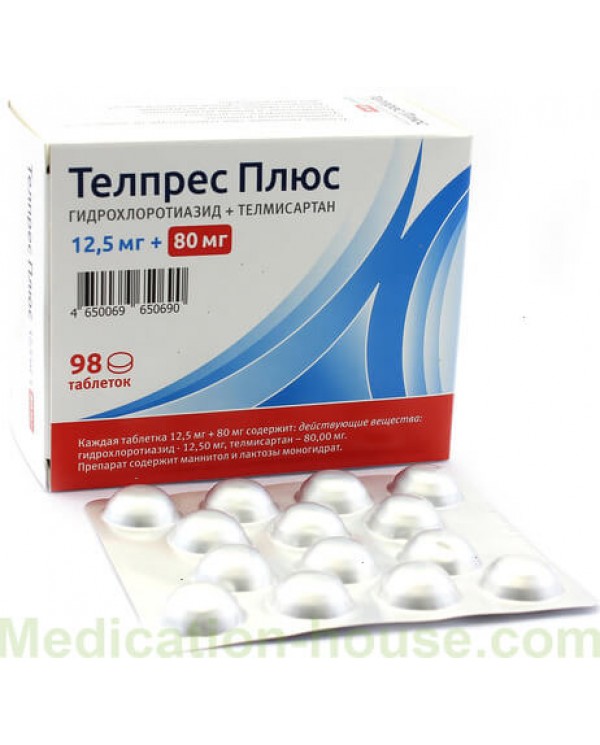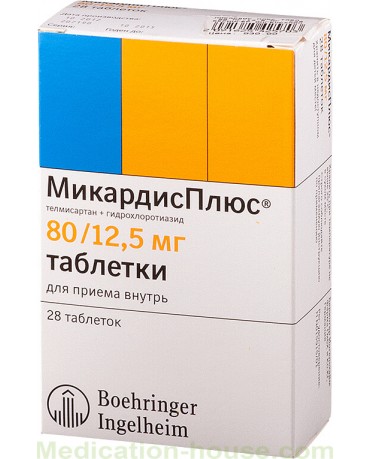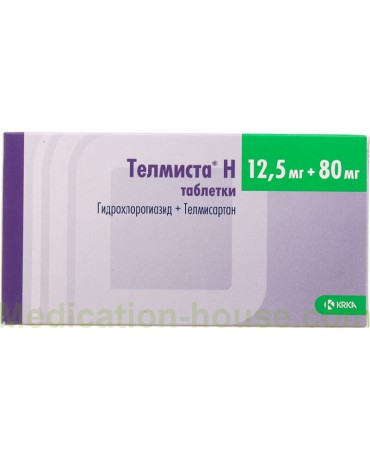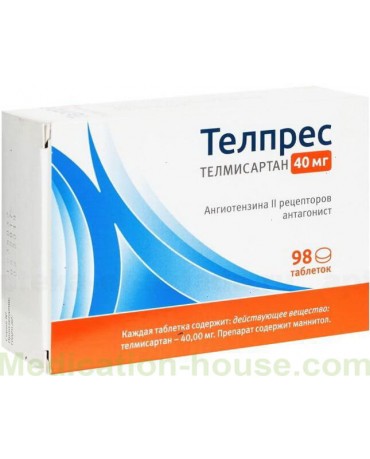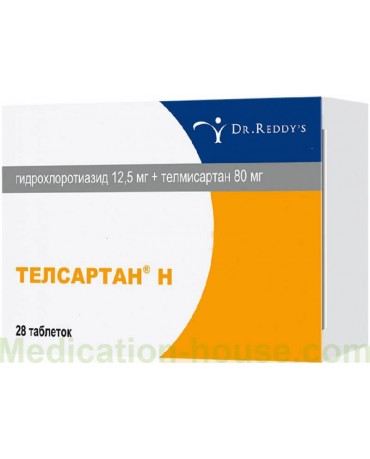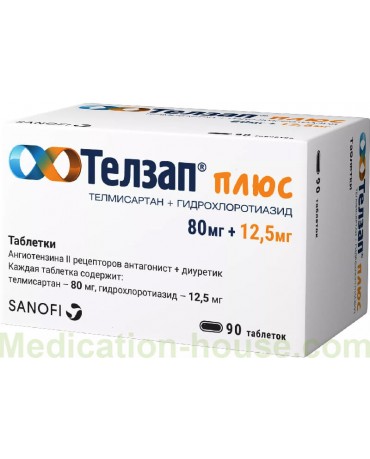Instruction for Telpres Plus
Reed more and buy Telpres Plus here
Telpres Plus is an antihypertensive agent.
Release form and composition
Dosage form - tablets: round, biconvex, two-layer, one layer is white, the other is yellow (dosage 12.5 + 40 mg and 25 + 80 mg) or pink (dosage 12.5 + 80 mg) color. Packaged in 14 pcs. in blisters, in a cardboard box instructions for the use of Telpres Plus and 2 or 7 blisters.
Composition of 1 tablet (12.5 + 40 mg / 12.5 + 80 mg / 25 + 80 mg):
active substances: hydrochlorothiazide - 12.5 / 12.5 / 25 mg, telmisartan - 40/80/80 mg;
auxiliary components: sodium hydroxide, sodium carboxymethyl starch (type A), povidone-K25, magnesium stearate, mannitol, microcrystalline cellulose, hypromellose, meglumine, lactose monohydrate, crospovidone, as well as a dye [dosage 12.5 + 40 mg and 25 + 80 mg - iron oxide yellow (E172), dosage 12.5 + 80 mg - iron oxide red (E172)].
Pharmacodynamics
Telpres Plus is a drug containing two active ingredients: telmisartan and hydrochlorothiazide. This combination causes a more pronounced decrease in blood pressure than each component alone. The maximum effect develops after 4-8 weeks of regular intake.
Telmisartan
Telmisartan is a specific angiotensin II receptor antagonist with a high affinity for the AT1 receptor subtype, through which the effect of angiotensin II is realized. Without antagonizing the receptor, it displaces angiotensin II from its connection with it. It has no affinity for other receptors, binds only to the AT1 subtype.
The drug reduces the level of aldosterone in the blood. Does not block ion channels, does not suppress plasma renin and kininase II, an angiotensin-converting enzyme that also contributes to the destruction of bradykinin. Therefore, it does not enhance the side effects that this peptide is capable of causing.
Taking telmisartan at a dose of 80 mg completely blocks the hypertensive effect of angiotensin II. The effect develops 3 hours after oral administration, persists for 24 hours and remains significant up to 48 hours. The pronounced effect develops within about 4 weeks of regular telmisartan intake.
In arterial hypertension, telmisartan reduces diastolic and systolic blood pressure (BP) without affecting the heart rate (HR). In the case of abrupt cessation of treatment, it does not cause the development of a withdrawal syndrome, therefore, blood pressure returns to the initial indicator gradually.
Hydrochlorothiazide
This drug is a thiazide diuretic and affects the reabsorption of electrolytes in the renal tubules, which directly enhances the excretion of chloride and sodium. The diuretic effect causes a decrease in circulating blood volume (BCC), an increase in plasma renin activity and aldosterone secretion, as well as a subsequent increase in the level of hydrocarbonates and potassium in the urine, which is the reason for a decrease in plasma potassium content.
Telmisartan, used in combination with hydrochlorothiazide, prevents potassium loss. The mechanism of this action is presumably due to the blockade of the renin-angiotensin-aldosterone system (RAAS).
The diuretic effect develops approximately 2 hours after oral administration, reaches a maximum after 4 hours and lasts for 6-12 hours.
With prolonged use, hydrochlorothiazide reduces the risk of developing complications from the cardiovascular system and mortality from them.
Pharmacokinetics
Both active components of Telpres Plus do not affect the pharmacokinetic characteristics of each other.
Telmisartan
Main pharmacokinetic characteristics:
absorption: after oral administration, the drug is rapidly absorbed from the gastrointestinal tract. The area under the concentration-time curve (AUC) with simultaneous food intake varies from 6% (using a dose of 40 mg) to 19% (using a dose of 160 mg). 3 hours after a meal, the plasma concentration levels off, and its value does not differ from that in patients who took telmisartan between meals. Bioavailability is approximately 50%;
distribution: about 99.5% of telmisartan binds to plasma proteins, mainly alpha-1 glycoprotein and albumin. The apparent volume of distribution (Vd) at equilibrium concentration is on average 500 liters;
metabolism: telmisartan is partially metabolized by conjugation with glucuronic acid, resulting in the formation of pharmacologically inactive metabolites;
excretion: it is excreted from the body mainly through the intestines unchanged, less than 2% of the dose is excreted by the kidneys. The half-life (T1 / 2) is more than 20 hours. The total plasma clearance is 900 ml / min, hepatic blood flow is 1500 ml / min.
Pharmacokinetics in special cases:
patient gender: in women, the maximum concentration (Cmax) and AUC are higher than in men, by about 3 and 2 times, respectively. Significant changes in efficacy were not noted, therefore, the dose does not need to be adjusted;
severe renal failure, including hemodialysis: it is recommended to use telmisartan at a lower initial dose - 20 mg per day;
mild to moderate liver dysfunction (classes A and B on the Child-Pugh scale): it is not recommended to exceed a daily dose of 40 mg.
Hydrochlorothiazide
Main pharmacokinetic characteristics:
absorption: after oral administration Cmax is achieved within 1-3 hours. Absolute bioavailability is about 60%;
distribution: about 64% of the taken dose binds to blood plasma proteins. Vd is 0.8 ± 0.3 l / kg;
excretion and metabolism: hydrochlorothiazide does not undergo biotransformation and is excreted by the kidneys practically unchanged. Approximately 60% of the dose taken orally is eliminated within 48 hours. Renal clearance is about 250-300 ml / min. Т1 / 2 is equal to 10-15 hours.
Pharmacokinetics in special cases:
gender of the patient: in women, Cmax is approximately 2-3 times higher than in men. Significant changes in efficacy were not noted, therefore, the dose does not need to be adjusted;
renal dysfunction: the rate of excretion of hydrochlorothiazide decreases, T1 / 2 increases to about 34 hours.
Indications for use
Telpres Plus is prescribed for arterial hypertension in patients in whom the use of hydrochlorothiazide or telmisartan as monotherapy was ineffective.
Contraindications
Absolute:
lactose intolerance, lactase deficiency, glucose-galactose malabsorption syndrome;
hypercalcemia;
refractory hypokalemia;
severe renal dysfunction (CC <30 ml / min);
severe functional disorders of the liver (class C according to the Child-Pugh classification);
obstructive diseases of the biliary tract;
age under 18;
period of pregnancy and lactation;
simultaneous use of angiotensin-converting enzyme (ACE) inhibitors in patients with diabetic nephropathy, aliskiren in patients with diabetes mellitus and / or renal dysfunction (glomerular filtration rate <60 ml / min / 1.73 m2);
hypersensitivity to any component of Telpres Plus tablets or other sulfonamide derivatives.
With caution, after a thorough assessment of the benefits and potential risks, the use of an antihypertensive drug is possible with moderate hepatic impairment (classes A and B according to the Child-Pugh classification), progressive liver disease, moderate renal impairment (CC> 30 ml / min), bilateral renal artery stenosis or stenosis of an artery of a single kidney, conditions after kidney transplantation, chronic heart failure of III-IV functional class according to the classification of the New York Heart Association, mitral / aortic valve stenosis, ischemic heart disease, idiopathic hypertrophic subaortic stenosis (hypertrophic obstructive cardiomyopathy) hyperkalemia, hypercalcemia, hypertriglyceridemia, hypercholesterolemia, decreased circulating blood volume (BCC) (due to vomiting, diarrhea, dietary restriction of salt, prior diuretic intake), diabetes mellitus, gout, hyperuricemia, primary hyperaldosterone izme, secondary angle-closure glaucoma, systemic lupus erythematosus, as well as in patients of the Negroid race and with the simultaneous administration of potassium-sparing diuretics, potassium preparations, ACE inhibitors, aliskiren.
Telpres Plus, instructions for use: method and dosage
Telpres Plus tablets should be taken orally, 1 time per day, preferably at the same time approximately. The dosage regimen does not depend on the time of meals.
Recommended dosages:
tablets 12.5 + 40 mg - if it is impossible to adequately control blood pressure using hydrochlorothiazide or 40 mg of telmisartan;
tablets 12.5 + 80 mg - if it is impossible to control blood pressure by taking Telpres Plus in a dosage of 12.5 + 40 mg or 80 mg of telmisartan;
tablets 25 + 80 mg - if it is impossible to control blood pressure by taking Telpres Plus at a dosage of 12.5 + 80 mg or 80 mg of telmisartan, as well as in cases where the condition was previously stabilized by a separate intake of hydrochlorothiazide or telmisartan.
In severe arterial hypertension, the maximum daily dose of telmisartan is 160 mg in combination with hydrochlorothiazide at a daily dose of 12.5 or 25 mg.
Patients with moderate liver dysfunction (classes A and B according to the Child-Pugh classification) are prescribed Telpres Plus 12.5 + 40 mg. Do not exceed this dose.
Side effects
respiratory system: shortness of breath, respiratory distress syndrome (including pneumonia and noncardiogenic pulmonary edema);
cardiovascular system: a pronounced decrease in blood pressure (up to the development of orthostatic hypotension), arrhythmia, bradycardia, tachycardia;
nervous system: fainting, sleep disturbances, insomnia, headache, irritability, paresthesia, dizziness;
psyche: anxiety, depression;
gastrointestinal tract: dryness of the oral mucosa, decreased appetite, flatulence, diarrhea, vomiting, constipation, abdominal pain, pancreatitis, anorexia, hypercholesterolemia, hyperglycemia;
liver and biliary tract: cholestatic / hepatocellular jaundice, liver dysfunction;
musculoskeletal and connective tissue: myalgia, muscle cramps, back pain, arthralgia, chest or back pain, calf muscle cramps, tendinitis-like symptoms, arthrosis;
kidneys and urinary tract: glycosuria, interstitial nephritis, renal failure (including acute);
blood and lymphatic system: anemia (iron deficiency, aplastic, hemolytic), leukopenia, eosinophilia, thrombocytopenia, agranulocytosis, neutropenia;
skin and subcutaneous tissues: drug rash, erythema, pruritus, increased sweating, eczema, photosensitivity, toxic epidermal necrolysis;
organ of vision: acute myopia, acute angle-closure glaucoma, transient blurred vision, visual impairment, xanthopsia;
immune system: relapse, exacerbation or intensification of symptoms of systemic lupus erythematosus, lupus-like reactions, systemic / necrotizing vasculitis, anaphylactic reactions, angioedema (up to death);
infectious and parasitic diseases: inflammation of the salivary glands, urinary tract infections (including cystitis), upper respiratory tract infections (sinusitis, pharyngitis, bronchitis), sepsis (up to death);
laboratory and instrumental studies: hypoglycemia (with diabetes mellitus), impaired glucose tolerance, hypomagnesemia, hypokalemia, hypertriglyceridemia, hyperuricemia, hyponatremia, hyperkalemia, a decrease in hemoglobin in the blood, an increase in the concentration of creatinine and uric acid in the blood, an increase in the activity of creatine phosphokinase;
others: general weakness, fever, flu-like syndrome, impotence.
Overdose
Symptoms that can develop with an overdose of individual components of Telpres Plus:
Telmisartan: dizziness, marked decrease in blood pressure, bradycardia, tachycardia, acute renal failure, increased concentration of creatinine in the blood;
hydrochlorothiazide: a decrease in BCC, water-electrolyte disturbances (hypochloremia, hypokalemia), which can contribute to the appearance of muscle spasms and / or an increase in arrhythmias caused by the combined use of cardiac glycosides or certain antiarrhythmic drugs.
Hemodialysis is ineffective. Symptomatic therapy is carried out under the control of serum creatinine and electrolytes.
Special instructions
In patients with reduced BCC, this deficiency should be eliminated before taking Telpres Plus.
Treatment should be carried out under periodic monitoring of the level of electrolytes in the blood serum, since hydrochlorothiazide (like all thiazide diuretics) can cause disturbances in the acid-base state and water-electrolyte balance (hypochloremic alkalosis, hypokalemia, hyponatremia). You should immediately consult a doctor if symptoms such as dry mouth, increased thirst, drowsiness, general weakness, anxiety, calf muscle cramps, myalgia, muscle weakness, excessive decrease in blood pressure, dyspeptic disorders develop.
Patients with diabetes mellitus on the background of antihypertensive therapy may require a change in the dose of oral hypoglycemic agents or insulin. Under the influence of hydrochlorothiazide, the likelihood of latent diabetes manifestation increases.
An excessive decrease in blood pressure in patients with coronary heart disease or ischemic cardiomyopathy exacerbates the risk of stroke or myocardial infarction.
Telpres Plus should be canceled before assessing the function of the parathyroid glands, since hydrochlorothiazide, due to a decrease in calcium excretion by the kidneys, can increase its content in the blood serum, and hypercalcemia may also indicate latent hyperparathyroidism.
Special observation during the treatment period is required for patients with disorders of uric acid metabolism. Thiazide diuretics can reduce the amount of iodine that binds to serum proteins, which is often not accompanied by signs of thyroid dysfunction.
If photosensitivity develops, it is necessary to stop taking Telpres Plus. When continuing treatment, it is advisable to avoid exposure to the sun and to protect the parts of the body that may be exposed to it.
During the doping test, a false positive reaction is likely to occur.
Influence on the ability to drive vehicles and complex mechanisms
Telpres Plus may cause drowsiness and dizziness. This must be taken into account when driving and performing potentially hazardous work.
Application during pregnancy and lactation
Telpres Plus is contraindicated for the treatment of hypertension in pregnant and breastfeeding women.
Childhood use
Telpres Plus is not intended for the treatment of patients under the age of 18.
With impaired renal function
Telpres Plus is contraindicated for: severe functional impairment of the kidneys (CC <30 ml / min);
the drug is used with extreme caution: moderate renal dysfunction (CC> 30 ml / min), conditions after kidney transplantation, bilateral renal artery stenosis or stenosis of an artery of a single kidney.
For violations of liver function
Telpres Plus is contraindicated for: severe functional disorders of the liver (class C according to the Child-Pugh classification);
the drug is used with extreme caution: moderate liver dysfunction (classes A and B according to the Child-Pugh classification), progressive liver disease.
Use in the elderly
No dosage change is required.
Drug interactions
Each of the active components of Telpres Plus can interact with other drugs / agents, which is fraught with the development of undesirable reactions, including potentially dangerous ones. Therefore, the combined use of any other drug should be discussed with your doctor.
Terms and conditions of storage
Store in original packaging at temperatures up to 25 ° C. Keep out of the reach of children.
Shelf life is 2 years.
Reviews about Telpres Plus
According to reviews, Telpres Plus is an effective antihypertensive drug that well reduces high blood pressure and maintains it at the required level during the day.
There are reports of the development of certain side effects, due to which patients had to switch to other antihypertensive drugs.
Terms of sell
You don't need a prescription from a doctor to buy Telpres Plus.

